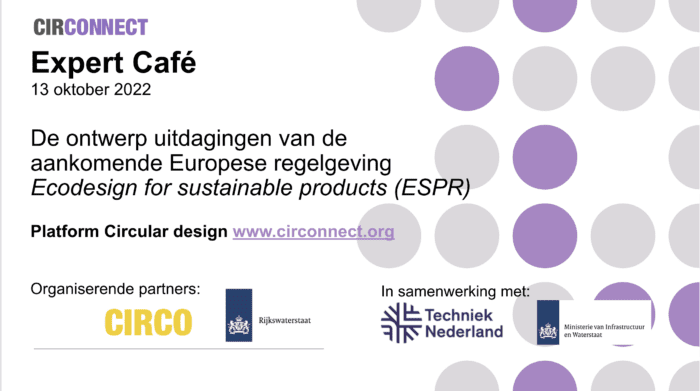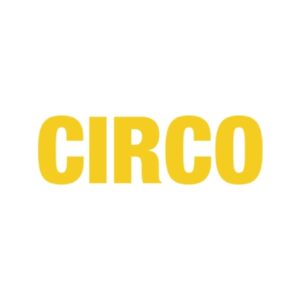
-
Sector
Construction, Consumer Goods, Manufacturing,
-
Target group
Companies, knowledge institutions, designers
-
Application
Far-reaching legislation is coming from Europe to make products more sustainable, reliable, reusable, repairable, easier to maintain, refurbish, recycle and energy and resource efficient. In this webinar you will learn more about the content and implications for design, the connection with circular design and practical experiences with already existing regulations.
On October 13, 2022, the Circular Design platform CIRCONNECT organized an Expert Café on the design challenges of the upcoming European regulations on eco-design for sustainable products. CIRCONNECT partners CIRCO and Rijkswaterstaat organized this session and together with the Ministry of Infrastructure and Water Management of and industry organization Techniek Nederland provided more background and insight into this topic.
Ecodesign - ESPR
Maja Valstar of the Ministry of Infrastructure and Water Management explained the framework of these upcoming regulations and showed what the planning looks like. The European Commission presented a proposal for a new Regulation on Ecodesign for Sustainable Products (ESPR) in late March. ESPR stands for ecodesign for sustainable product regulation, formerly known as: Sustainable Products Initiative.
It includes new product requirements to make virtually all products more durable, reliable, reusable, repairable, easier to maintain, refurbish, recycle and energy and resource efficient in the short or medium term. Ecodesign is an important lever for sustainability and circularity because design determines up to 80% of the environmental impact of a product during its life cycle.
Far-reaching regulation
The new legislation goes far beyond the current directive, which focuses primarily on energy consumption of products. Among the issues addressed in the new legislation are: repairability, longevity, reliability, materials used, environmental impact
All regulated products also receive a digital product passport with product-specific information. This will ensure that consumers know better the environmental impact of their purchases. Furthermore, it facilitates the recovery, recycling or detection of substances of concern in the supply chain. The proposal also includes measures to end the destruction of unsold consumer goods, as well as a proposal for binding criteria for green public procurement as an incentive for sustainable products.
What product groups are involved?
The product groups have yet to be determined. The collection of suggestions for this is scheduled for the end of 2022. The Commission's preliminary assessment showed that product categories such as textiles, furniture, mattresses, tires, detergents, paints and lubricants should be prioritized. So should intermediate products such as iron, steel and aluminum. The new legislation is expected to apply to almost all products/sectors with some exceptions.
Planning
For now, this new legislation is not here. Member states can now provide input via a BNC fiche. This will be followed by a consideration process by the European Council and European Parliament. The first new implementing regulations, worked out for the first product groups, are expected from 2024. Preparations for this are already underway this year.
Coherence with circular design
Jeannette Levels-Vermeer of CIRCO addressed the connection with circular design. Using the framework circular design, she showed how much this new legislation is related to circular design, as it impacts all phases of a product and encompasses multiple design dimensions. So the framework can help to plot the different parts of the legislation and make the related design questions and coherence clear.
Practical experiences
Martin Hof of Techniek Nederland, the business association of technical service providers, installation companies and the technical retail sector, explained what their members are currently up against with regard to the current ecodesign directive and other regulations around recycling and reparability. Sometimes different regulations conflict and actually have a negative effect on making products more circular. It is important that these experiences are fed back to Rijkswaterstaat and I&W so that they can be improved and serve as input for future regulations.
Looking back and deepening
The following presentations were given during the Expert Café:
- click on the title to download the presentation -.
Ecodesign for Sustainable Products
- Maja Valstar of the Ministry of Infrastructure and Water Management
The connection to Circular Design
- Jeannette Levels-Vermeer of CIRCO & LBP | Sight
Real-world regulatory experiences
- Martin Hof of Techniek Nederland
Watch the webinar You go to a Dutch version

